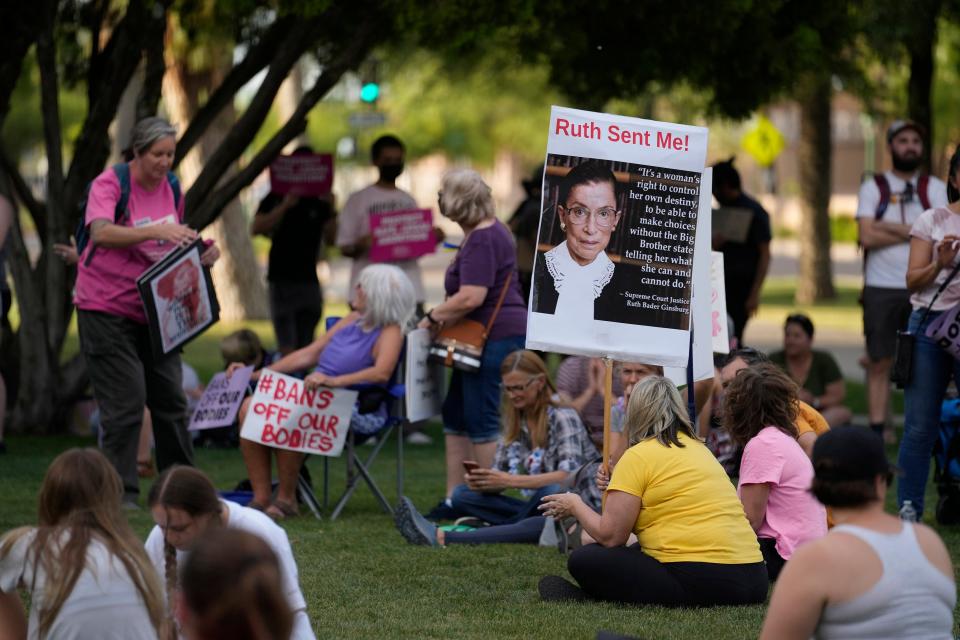Overturning Roe would unleash chaos, state fights and even more partisan politics
Justice Samuel Alito’s leaked draft opinion in the Dobbs case has generated predictable reactions. The anti-abortion community loves the clarity of simply erasing the Roe/Casey precedent. The abortion-rights community hates it.
The predictability of that rhetoric and the mirage of reaching closure on Roe/Casey should not blind the justices to the destructive practical consequences of such a decision, especially for a swing state such as Arizona.
Many constitutional scholars concede that Roe was poorly decided. It overstretched the malleable 14th Amendment. It also roiled national politics and corrupted the process of Supreme Court appointments, where both sides regard Roe/Casey as a litmus test.
The current court may understandably curse the mess that the Burger court created. But this constitutional pottery is already broken, and the pieces have been scattered for too long and too widely to be glued together. There is, now, no easy solution.
The remedy to crashing into a tree is not, as the Casey court recognized, to crash into a tree on the other side of the road.
The politics of lost rights can spin out of control
I know from personal experience the tumult created when people feel they are losing cherished rights or privileges. I was president of the board of the Tucson Unified School District when a majority of us voted to shut down its Mexican-American Studies program in 2012, after long controversy and finally losing a judicial appeal.
Loud protestors invaded my college classroom, picketed my house and seized control of a board meeting. My former colleagues in the Democratic Party planted “Stop Stegeman” signs all over town. I left the party, in a heavily Democratic town, and won reelection twice, but it was brutal.
Ironically, after the law banning the program was ruled unconstitutional in 2017, and progressives regained control of the board in 2019, nothing changed. The board restored no part of the once-banned program.
The point is that the politics surrounding lost rights can spin far beyond what is actually at stake. And Arizona, waiting for resolution of the Dobbs case, actually has much at stake.
On one hand, more Arizonans support than oppose abortion rights. A reputable Pew Research Center survey in 2014 found that 49% supported the right to an abortion in most or all cases, while 46% similarly opposed it. Pew’s separate annual national survey on abortion has found a sharp swing in favor of abortion rights since 2014. Projecting that national trend onto Arizona suggests that the 3% gap in favor of abortion rights in 2014 has increased to 12% in 2022.
Yet Justice Alito’s draft opinion would apparently restore a 1901 Arizona law that bans almost all abortions. Imagine where that would send state politics.
Abortion is an inherently intractable issue

The court has other reasons to show restraint. Reasonable people disagree sharply about when a fetus becomes human. It is an eternal moral question, which transcends science. This makes abortion an issue sui generis, perhaps the only question in American politics that is inherently intractable. The court should treat it with the respect, and reserve, that this singular status deserves.
Justice Oliver Wendell Holmes, Jr., famously observed: “Great cases, like hard cases, make bad law.” If it is hard to pull good law out of the morass surrounding the Roe decision, then wisdom counsels a modest approach.
Modesty has not been the trend. Since 2010 (Citizens United), the Court has shown a new willingness to overturn long-established precedents by 5-4 votes, reversals not always mirrored by shifts in public opinion
Such narrow reversals raise the stakes for Supreme Court appointments. The political drama surrounding nominations rises accordingly, and bad ideas such as court packing gain momentum. Is the court comfortable with that legacy?
Reversing Roe is rife with negative consequ
Erasing the Roe/Casey precedent would invite other practical problems. Self-sorting migration will cause states to get redder and bluer, exacerbating the Senate’s dysfunction. Abortion questions will continue to burn in state and national politics and in some states burn even hotter.
Realistic or not, the possibility of reestablishing Casey through yet another reversal will animate many, as will the antithesis of extending 14th Amendment protections to the fetus.
Ancillary legal questions will arise or intensify concerning contraception, pharmaceutical abortion, external fertilization, and the tradeoff between the lives of fetus and mother. As an economist, I foresee bizarre battles over the Commerce Clause, as states struggle to control other states’ policies and practices.
Finally, the unique circumstances of this reversal would hurt the court. A respected senator’s statement that it would be “completely inconsistent” with two justices’ private attestations, and the extraordinary process that led to a third justice’s confirmation, will deeply stain the decision for much of the population.
The Burger court may have been reckless, but it would probably not have adopted a decision as momentous as Roe by a 5-4 vote. The current court should not allow righteous indignation at the Roe decision to overwhelm its prudence.
Mark Stegeman teaches economics at University of Arizona's Eller College of Management. He served on the governing board of the Tucson Unified School District for more more than 10 years. Reach him at markwstegeman@gmail.com.
This article originally appeared on Arizona Republic: Overturning Roe would invite state fights and more partisan politics

